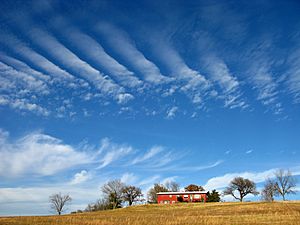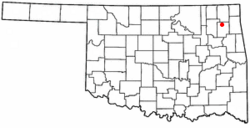Adair, Oklahoma facts for kids
Quick facts for kids
Adair, Oklahoma
|
|
|---|---|

A farm in Adair, Oklahoma
|
|

Location of Adair, Oklahoma
|
|
| Country | United States |
| State | Oklahoma |
| County | Mayes |
| Area | |
| • Total | 4.92 sq mi (12.73 km2) |
| • Land | 4.92 sq mi (12.73 km2) |
| • Water | 0.00 sq mi (0.00 km2) |
| Elevation | 679 ft (207 m) |
| Population
(2020)
|
|
| • Total | 732 |
| • Density | 148.93/sq mi (57.50/km2) |
| Time zone | UTC-6 (Central (CST)) |
| • Summer (DST) | UTC-5 (CDT) |
| ZIP code |
74330
|
| Area codes | 539/918 |
| FIPS code | 40-00250 |
| GNIS feature ID | 2412333 |
Adair is a small town in Mayes County, Oklahoma, United States. In 2020, about 732 people lived there. Back in 2010, the population was 790. The town was started in 1883 and is named after two important Cherokee brothers. It also had an early school for Cherokee students.
Contents
History of Adair
Adair got its name from two Cherokee brothers: William Penn Adair, who was a politician and judge, and Dr. Walter Thompson Adair. The town was officially started on March 15, 1883. It became an "incorporated" town in 1897. This means it became an official city with its own local government. William Penn Adair lived in the area for about 17 years, starting in the late 1860s.
In the 1880s, a school for Cherokee children opened in Adair. Later, in 1907, just before Oklahoma became a state, the school also started letting white students attend.
The Dalton Gang Train Robbery
On July 14, 1892, the famous Dalton Gang carried out a very bold train robbery in Adair. This was in what was then called Indian Territory.
Here is how it happened:
- Four members of the gang went to the train station.
- They told the night operator to signal a train to stop.
- When the train stopped, two gang members got onto the engine.
- Others kept watch over the conductor and train workers.
- The station operator was taken to the express car, which carried valuable goods.
- He was told to make the messenger inside open the car.
- When the messenger refused, the train's fireman was forced to break the door open.
- Once inside, the robbers quickly took everything from the safe.
What the gang didn't know was that there were eight special railroad guards on the train. These guards were there to stop robberies like this one. The guards were led by J. J. Kinney, a chief railroad detective, and Captain J. H. LaFlore, chief of the Cherokee Nation police.
When the guards realized a robbery was happening, they got off the train. They had a short gunfight with some of the robbers. After taking what they wanted from the train, the gang escaped through the town.
During the gunfight, two doctors, W. L. Goff and Youngblood, were sitting on a porch nearby. They were hit by stray bullets. Sadly, Dr. Goff was badly hurt and died. Captain Kinney and Captain LaFlore were also wounded, but they got better. The railroad and the express company offered a reward of $5,000 for each robber caught and found guilty.
Where is Adair?
Adair is about 10 miles (16 km) north of Pryor. It is located on U.S. Route 69 in Mayes County. The town is in the northeastern part of Oklahoma, an area known as "Green Country." It is also close to the borders of Kansas, Missouri, and Arkansas.
The United States Census Bureau says that Adair covers an area of 4.5 square miles (12 km2). All of this area is land.
Churches in Adair
There are several churches in and around Adair. Inside the town itself, you can find the Adair United Methodist Church, the First Baptist Church of Adair, and the Adair Christian Church.
Climate and Weather
Adair usually has more sunny days than the average city in the U.S. It also gets much less snowfall. The wettest time of the year in Adair is late spring. The driest time is during the winter months.
| Climate data for Adair | |||||||||||||
|---|---|---|---|---|---|---|---|---|---|---|---|---|---|
| Month | Jan | Feb | Mar | Apr | May | Jun | Jul | Aug | Sep | Oct | Nov | Dec | Year |
| Mean daily maximum °F (°C) | 47.0 (8.3) |
52.5 (11.4) |
61.0 (16.1) |
71.8 (22.1) |
79.1 (26.2) |
87.0 (30.6) |
93.0 (33.9) |
93.3 (34.1) |
85.0 (29.4) |
74.9 (23.8) |
60.4 (15.8) |
50.4 (10.2) |
71.3 (21.8) |
| Mean daily minimum °F (°C) | 24.6 (−4.1) |
28.9 (−1.7) |
36.3 (2.4) |
47.4 (8.6) |
56.4 (13.6) |
65.1 (18.4) |
69.4 (20.8) |
68.0 (20.0) |
59.7 (15.4) |
48.0 (8.9) |
36.2 (2.3) |
27.9 (−2.3) |
47.3 (8.5) |
| Average precipitation inches (mm) | 2.0 (51) |
2.0 (51) |
3.1 (79) |
4.2 (110) |
5.2 (130) |
5.2 (130) |
3.1 (79) |
3.3 (84) |
4.6 (120) |
3.8 (97) |
3.2 (81) |
2.2 (56) |
41.9 (1,068) |
| Source: Weatherbase | |||||||||||||
People in Adair (Demographics)
| Historical population | |||
|---|---|---|---|
| Census | Pop. | %± | |
| 1900 | 268 | — | |
| 1910 | 376 | 40.3% | |
| 1920 | 369 | −1.9% | |
| 1930 | 290 | −21.4% | |
| 1940 | 407 | 40.3% | |
| 1950 | 299 | −26.5% | |
| 1960 | 434 | 45.2% | |
| 1970 | 459 | 5.8% | |
| 1980 | 508 | 10.7% | |
| 1990 | 685 | 34.8% | |
| 2000 | 704 | 2.8% | |
| 2010 | 790 | 12.2% | |
| 2020 | 732 | −7.3% | |
| U.S. Decennial Census | |||
In 2010, the town of Adair had 790 people. This means there were about 180 people for every square mile. There were 315 homes in the town.
Most of the people living in Adair were white (72.4%). About 18.9% were Native American. A small number (0.6%) were from other races, and 8.0% were from two or more races. About 3.5% of the population was Hispanic or Latino.
Out of all the homes:
- 36.8% had children under 18 living there.
- 57.7% were married couples.
- 12.1% had a female head of household with no husband.
- 26.8% were not families.
About 23.2% of homes had only one person living there. About 8.5% of homes had someone 65 years or older living alone. The average home had 2.59 people, and the average family had 3.06 people.
The average age of people in Adair was 34 years old. About 27.6% of the people were under 18. About 12.1% were 65 or older. For every 100 females, there were about 90 males.
The average income for a home in Adair was $35,250. For families, it was $38,500. Men generally earned more than women. The average income per person in the town was $14,388. About 12.3% of all people in Adair lived below the poverty line. This included 22.2% of those under 18 and 2.8% of those 65 or older.
Education in Adair
Students in Adair attend schools that are part of the Adair Independent School District.
Notable People from Adair
- William Penn Adair: A leader, politician, and judge of the Cherokee Nation. He lived in Adair for many years.
- Evelyn Varden (1893-1958): She was born here and became a famous film and stage actress. You might know her from movies like The Bad Seed or The Night of the Hunter.
- Harley Hughes: A lieutenant general in the United States Air Force. He was a high-ranking officer from 1985 to 1988.
See also
 In Spanish: Adair (Oklahoma) para niños
In Spanish: Adair (Oklahoma) para niños
 | John T. Biggers |
 | Thomas Blackshear |
 | Mark Bradford |
 | Beverly Buchanan |

